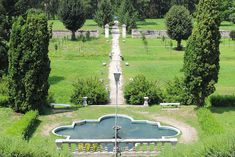Historical open spaces in a pub?
Historical open spaces in a pub? In October 2013, an international online course that deals with historic open spaces and tourism started for the first time at the Institute of Landscape Architecture.
Professors from the University of Natural Resources and Life Sciences, from the Technical University Berlin and from the University of Applied Sciences IMC Krems teach in this winter semester together in a virtual classroom. They exchange with master students of landscape architecture from Croatia, Austria, Serbia, Slovakia, Slovenia, Spain and Hungary on "Garden heritage conservation and tourism". The English course is composed of lectures and practice sessions. Although the countries are very far apart: Computers and Internet let the students move closer together. All participants are equipped with a camera and a microphone, so that a direct interaction is possible. The students sit in their rooms or even in an Irish pub and listen to the presentations by Lilli Licka, Nobert Kühn and Claudia Bauer-Krösbacher. Professor Lilli Licka from the Institute of Landscape Architecture holds interactive lectures that deal with the collection, analysis and evaluation of the inventory in historically valuable open spaces. She also gives a lecture about how these open spaces can be protected and preserved. Professor Dr. Norbert Kühn from the Department of vegetation technology and plant using of the Technical University of Berlin introduced to the students, for example, the use of trees, shrubs and perennials in historic gardens and parks. He also talks about the interfaces that exist between open spaces under protection and nature conservation. Dr. Claudia Bauer-Krösbacher from the University of Applied Sciences IMC Krems provides knowledge in sustainable tourism marketing of historic open spaces. In each lecture, the students are given tasks. With these tasks, students engage in self-study and on the basis of an open space of their choice in their region. The results are presented and discussed in the virtual classroom. The online course takes place in the framework of research project co-financed by the European Union called "CultTour - Cultural (garden) heritage as a focal point for sustainable tourism". The three academic institutions BOKU, TU Berlin and IMC Krems work closely together with partners from Romania, Bulgaria, Greece and Italy. Together they develop strategies that deal with "Cultural (garden) heritage as a focal point for sustainable tourism" in Southeast Europe. Links: Project description http://www.culttour.eu

